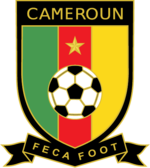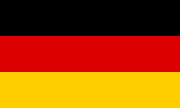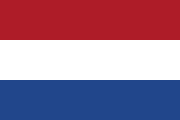Cameroon national football team
 |
|||
| Nickname(s) | Les Lions Indomptables (The Indomitable Lions) |
||
|---|---|---|---|
| Association | Fédération Camerounaise de Football | ||
| Confederation | CAF (Africa) | ||
| Head coach | Javier Clemente | ||
| Captain | Samuel Eto'o | ||
| Most caps | Rigobert Song (138) | ||
| Top scorer | Samuel Eto'o (52) | ||
| FIFA code | CMR | ||
| FIFA ranking | 40 | ||
| Highest FIFA ranking | 11 (November 2006) | ||
| Lowest FIFA ranking | 62 (April 1997) | ||
| Elo ranking | 45 | ||
| Highest Elo ranking | 12 (June 2003) | ||
| Lowest Elo ranking | (April 1995) | ||
|
|||
| First international | |||
(Madagascar; 13 April 1960) |
|||
| Biggest win | |||
(Madagascar; 13 April 1960) |
|||
| Biggest defeat | |||
(Oslo, Norway; 31 October 1990) (Palo Alto, California, USA; 28 June 1994) (San José, Costa Rica; 9 March 1997) |
|||
| World Cup | |||
| Appearances | 6 (First in 1982) | ||
| Best result | Quarterfinals, 1990 | ||
| Africa Cup of Nations | |||
| Appearances | 16 (First in 1970) | ||
| Best result | Winners, 1984, 1988, 2000, 2002 |
||
| Confederations Cup | |||
| Appearances | 2 (First in 2001) | ||
| Best result | Runners-up, 2003 | ||
| Olympic medal record | ||
| Men’s Football | ||
|---|---|---|
| Gold | 2000 Sydney[1] | Team |
The Cameroon national football team, nicknamed Les Lions Indomptables (The Indomitable Lions), is controlled by the Fédération Camerounaise de Football and is Africa's most successful side; Cameroon has qualified for the FIFA World Cup six times – in 1982, 1990, 1994, 1998, 2002 and 2010– more than any other African nation. They were the first African team to reach the quarterfinal of the World Cup, in 1990, losing to England in extra time. They have also won four Africa Cup of Nations and a gold medal at the 2000 Summer Olympics[1].
History

First games
Cameroon played its first match against Djibouti in 1960, winning 9–2. They first qualified for the Africa Cup of Nations in 1970, but were knocked out in the first round. Two years later, as host nation, the Indomitable Lions finished third in the 1972 Africa Cup of Nations. They would not qualify for the competition for another ten years.
FIFA 1982 World Cup
Cameroon qualified for its first FIFA World Cup in 1982. With the increase of 16 to 24 teams Cameroon qualified along with Algeria to represent Africa in Spain. Cameroon was drawn into group 1 with Italy, Poland, and Peru. In their first game Cameroon faced Italy and held on to a surprising 1–1 draw. Cameroon held Peru and Poland to 0–0 draws but failed to qualify for the second round.
African Nations, 1984
Two years later Cameroon qualified for the 1984 Africa Cup of Nations, held in Côte d'Ivoire. They finished second in their first-round group before beating Algeria on penalties in the semi-final. In the final, Cameroon beat Nigeria 3–1 with goals from René N'Djeya, Théophile Abéga and Ernest Ebongué to become champions of Africa for the first time.
FIFA 1990 World Cup
Cameroon qualified for the 1990 World Cup by surpassing Nigeria and beating Tunisia in the final round playoff. In the final tournament Cameroon were drawn into group B with Argentina, Romania, and the Soviet Union. Cameroon defeated defending champions Argentina in the opening game 1–0 with a goal scored by François Omam-Biyik. Cameroon later defeated Romania 2–1 and lost to the Soviet Union 0-4, becoming the first side to top a World Cup Finals group with a negative goal difference. In the second round Cameroon defeated Colombia 2–1 with the 38 year old Roger Milla scoring two goals in the extra time. In the quarter finals Cameroon faced England. After 25 minutes England's David Platt scored for England. In the second half however Cameroon came back with a 61st minute penalty from Emmanuel Kundé and took the lead with Eugène Ekéké on 65 minutes. England however equalized in the 83rd minute with a penalty from Gary Lineker. Lineker made in 3–2 for England with a penalty in the 105th minute.
FIFA 1994 World Cup
The 1994 World Cup in the USA saw the adjustment of representation for three African teams qualify. Cameroon qualified with Nigeria and Morocco. In the final tournament Cameroon were drawn into group B with Sweden, Brazil, and Russia. After a convincing 2–2 draw with Sweden, Cameroon were determined to make an impact. However a 3–0 loss to Brazil and a 6–1 loss to Russia knocked them out. In their last game against Russia, the then 42 year old Roger Milla became the oldest player to play and score in a World Cup Finals match.
FIFA 1998 World Cup
The 1998 World Cup in France saw the increase of 24 to 32 teams. Cameroon qualified alongside five African countries. After qualifying as expected, Cameroon were drawn into group B with Italy, Chile, and Austria. Despite drawing with Chile and Austria, a 3–0 defeat to Italy saw Cameroon finish bottom of the group, and they were eliminated as a result. Cameroon had three players sent off in the course of the tournament, more than any other team, despite only playing three games out of a possible seven. They also had the highest card count per game of any team, collecting an average of four bookings in each match they played.[2]
2002 FIFA World Cup
Cameroon qualified for the 2002 World Cup in Korea-Japan clinching first place in their group which included Angola, Zambia, and Togo. In a warm-up game, Cameroon again came close to being the first African team to defeat England, in a 2-2 draw. England as yet, are still undefeated by an African nation. Cameroon were drawn into group E with Germany, Ireland, and Saudi Arabia. Cameroon started with a 1–1 draw with Ireland after giving up the lead and later defeated Saudi Arabia 1–0. In their last game Cameroon were defeated 2–0 by Germany and were narrowly eliminated by the Irish who had not lost a game.
Missing out on Germany 2006
In the 2006 World Cup qualifying round Cameroon were drawn into group 3 with Côte d'Ivoire, Egypt, Libya, Sudan, and Benin. Cameroon led the group for most of the time until their final game. On October 8, 2005 Cameroon drew with Egypt 1–1 while Côte d'Ivoire defeated Sudan 3–1. This result prevented Cameroon from making the World Cup.
2010 World Cup Qualification
In Cameroon's 2010 World Cup qualifying campaign, the team was grouped with the Gabon, Togo, and Moroccan national football teams. After a slow start in their campaign, with a shocking loss to Togo and a draw against Morocco, the coach of Cameroon, Otto Pfister, was fired and Frenchman Paul Le Guen was appointed as the new coach. Le Guen's appointment caused an uprise in Cameroon's spirits as they got a win against Gabon in Libreville, followed by another win against the Panthers four days later in Yaounde. One month later, they defeated Togo in Yaounde by 3 goals. On November 14, 2009, Cameroon defeated the Atlas Lions of Morocco 2–0 in Fez in their last match of their campaign. Gabon was also defeated by Togo 1–0 in Lome. Both results caused Cameroon to qualify for the 2010 FIFA World Cup in South Africa.[3]
The Indomitable Lions were the first team to be mathematically eliminated in the 2010 FIFA World Cup, going out in their second group match to Denmark after losing it 1–2, following a 0-1 defeat to Japan.
Controversy about sleeveless and one-piece kits
Cameroon used sleeveless PUMA shirts at the 2002 African Cup of Nations in Mali. FIFA, however, didn't allow Cameroon to use the same kits at the 2002 FIFA World Cup, and black sleeves were added to the shirts.[4] The 2004 African Cup of Nations witnessed Cameroon again run into controversy regarding their kits. PUMA had designed a one-piece kit for the Cameroon team which FIFA declared illegal, stating that the kits must have separate shirts and shorts. FIFA then imposed fines on Cameroon and deducted six points from their qualifying campaign. PUMA argued that a two-piece kit is not stated as a requirement in the FIFA laws of the game. PUMA however lost the case in court, and Cameroon were forced to wear two-piece kits, but FIFA subsequently restored the six qualifying points to Cameroon.
The death of a team member
In the 72nd minute of the 2003 FIFA Confederations Cup semi-final between Cameroon and Colombia, midfielder Marc-Vivien Foé collapsed. He was pronounced dead several hours later. In the final against France, Cameroon wore shirts embroidered with Foé's name and dates of birth and death.
World Cup record
| Year | Round | Position | GP | W | D* | L* | GS | GA |
|---|---|---|---|---|---|---|---|---|
| 1930 to 1962 | Not a FIFA member | - | - | - | - | - | - | - |
| 1966 | Withdrew | - | - | - | - | - | - | - |
| 1970 to 1978 | Did not qualify | - | - | - | - | - | - | - |
| 1982 | Round 1 | 17 | 3 | 0 | 3 | 0 | 1 | 1 |
| 1986 | Did not qualify | - | - | - | - | - | - | - |
| 1990 | Quarter-finals | 8 | 5 | 3 | 0 | 2 | 7 | 9 |
| 1994 | Round 1 | 22 | 3 | 0 | 1 | 2 | 3 | 11 |
| 1998 | Round 1 | 25 | 3 | 0 | 2 | 1 | 2 | 5 |
| 2002 | Round 1 | 20 | 3 | 1 | 1 | 1 | 2 | 3 |
| 2006 | Did not qualify | - | - | - | - | - | - | - |
| 2010 | Round 1 | 31 | 3 | 0 | 0 | 3 | 2 | 5 |
| Total | 6/19 | 18 | 4 | 7 | 7 | 16 | 32 |
Confederations Cup record
| Year | Round | GP | W | D* | L | GS | GA |
|---|---|---|---|---|---|---|---|
| 1992 to 1999 | Did not qualify | - | - | - | - | - | - |
| 2001 | Round 1 | 3 | 1 | 0 | 2 | 2 | 4 |
| 2003 | Second place | 5 | 3 | 1 | 1 | 3 | 1 |
| 2005 to 2009 | Did not qualify | - | - | - | - | - | - |
| Total | 2/8 | 8 | 4 | 1 | 3 | 5 | 5 |
African Nations Cup record
| African Cup of Nations | |||||||||
|---|---|---|---|---|---|---|---|---|---|
| Titles: 4 Appearances: 16 |
|||||||||
| Year | Position | Year | Position | Year | Position | ||||
| Did not enter | Did not qualify | Champions | |||||||
| Did not enter | Did not qualify | Round 1 | |||||||
| Did not enter | Did not qualify | Quarter-finals | |||||||
| Did not enter | Round 1 | Champions | |||||||
| Did not enter | Champions | Champions | |||||||
| Did not qualify | Second place | Quarter-finals | |||||||
| Round 1 | Champions | Quarter-finals | |||||||
| Third place | Round 1 | Second place | |||||||
| Did not qualify | Fourth place | Quarter-Finals | |||||||
Current squad
The following 23 players were named to the squad for the 2012 CAF Qualifying against Mauritius
Caps and goals updated as of August 10, subsequent to their Friendly Match against Poland.
|
|||||||||||||||||||||||||||||||||||||||||||||||||||||||||||||||||||||||||||||||||||||||||||||||||||||||||||||||||||||||||||||||||||||||||||||||||||||||||||||||||||||||||||||||||||||||||||||||||||
Recent Call ups
|
||||||||||||||||||||||||||||||||||||||||||||||||||||||||||||||||||||||||||||||||||||||||||||||||||||||||||||||||||||||
Managers
- 1982
 Jean Vincent
Jean Vincent - 1988–90
 Valeri Nepomniachi
Valeri Nepomniachi - 1ytt92
 Philippe Redon
Philippe Redon - 1992–93
 Jules Nyongha
Jules Nyongha - 1994
 Henri Michel
Henri Michel - 1994–96
 Jules Nyongha
Jules Nyongha - 1996–97
.svg.png) Henri Depireux
Henri Depireux - 1997–98
 Jean Manga Onguene
Jean Manga Onguene - 1998
 Claude Le Roy
Claude Le Roy - 1998-00
 Pierre Lechantre
Pierre Lechantre - 2000–01
 Jean-Paul Akono
Jean-Paul Akono - 2001
 Pierre Lechantre
Pierre Lechantre - 2001
 Robert Corfu
Robert Corfu - 2001–04
 Winfried Schäfer
Winfried Schäfer - 2005–06
 Artur Jorge
Artur Jorge - 2006–07
 Arie Haan
Arie Haan - 2007
 Jules Nyongha
Jules Nyongha - 2007–09
 Otto Pfister
Otto Pfister - 2009
 Thomas Nkono
Thomas Nkono - 2009–10
 Paul Le Guen
Paul Le Guen - 2010–12
 Javier Clemente
Javier Clemente
See also
- Cameroon women's national football team
References
- ↑ 1.0 1.1 Since 1992, squads for Football at the Summer Olympics have been restricted to three players over the age of 23. The achievements of such teams are not usually included in the statistics of the international team.
- ↑ "Top Cards – France 1998". fifa.com. http://www.fifa.com/worldcup/archive/edition=1013/statistics/teams/topcards.html. Retrieved November 21, 2009.
- ↑ "Indomitable Lions roar through to record sixth finals". ESPN. 2009-11-14. http://soccernet.espn.go.com/report?id=262942&league=FIFA.WORLDQ.CAF&cc=5739. Retrieved 2010-02-04.
- ↑ "Fifa bans Cameroon shirts". BBC Sport. 2002-03-09. http://news.bbc.co.uk/sport2/hi/football/africa/1862872.stm. Retrieved 2009-11-14.
External links
- Fédération Camerounaise de Football official site
- RSSSF archive of results 1960–
- 2010 World Cup ESPN Profile
- Facebook page
- Cameroon Football Fan Page
|
||||||||||||||
|
|||||||||||||||||||||||||||||
|
||||||||
|
|||||||||||||||||||||||
|
|||||||||||||||||||||||
